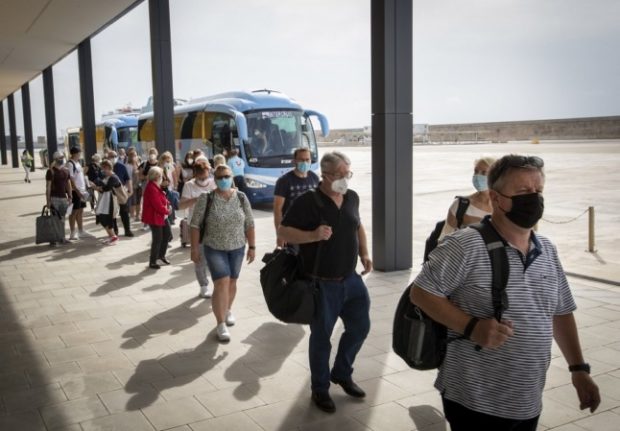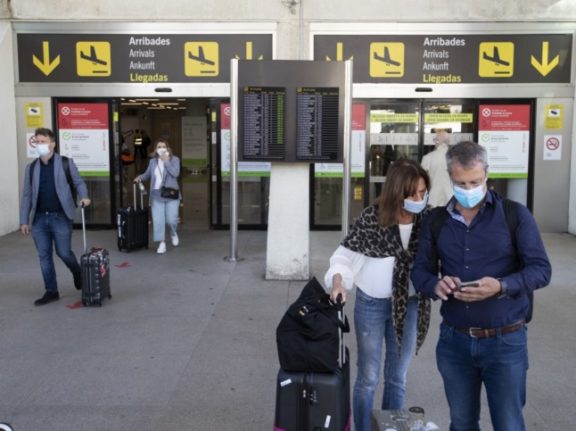Spain’s Mediterranean archipelago – called las Islas Baleares in Spanish – were among the 14 countries and territories which were added by the UK government to the green list on Thursday June 24th.
This latest update of the UK’s eased travel restrictions comes into effect on June 30th and will be reviewed again in three weeks.
The Balearics’ 14-day infection rate is among the lowest in Spain at 48 per 100,000 inhabitants.
Entry requirements to the Balearic Islands
Since late May, UK holidaymakers travelling to Spain are not required to show a negative Covid-19 test to visit the Balearics or the rest of the country.
However, on Monday June 28th Spanish Prime Minister Pedro Sánchez announced that British tourists would have to meet the same “entry requirements as other European tourists” to visit the Balearic Islands.
“They will need a complete vaccination certificate or negative PCR,” Sánchez said.
“The measure will come into force within 72 hours”, he added, meaning Tuesday June 29th or Wednesday June 30th.
The majority of EU/EEA travellers have to present either a vaccination certificate showing they completed their treatment more than 14 days before travel to Spain or proof of a negative PCR taken within 72 hours before travel (antigen also allowed for EU/EEA, taken within 48 hours).
Spain and the EU’s Digital Covid Certificate, a system which is meant to ease travel within the bloc, isn’t currently available to third country nationals travelling to Spain, so Brits have to present a vaccination certificate “issued by the competent authorities” of their country, with paper and digital formats accepted.
READ ALSO:
- What should a vaccination certificate for travel to Spain include?
- What are the rules on travelling to Spain for international travellers?
However, UK nationals must make sure they complete a health control form in the 48 hours prior to flying to the Balearic Islands, by visiting the Spain Travel Health website or downloading the app. The QR code Spanish authorities send makes travel checks easier and faster.
READ ALSO: The most common problems with the Spain Travel Health app and some potential solutions
If you fly first to another part of Spain (not airport transit), and then fly a few days later to the Balearics, you may be asked to show an antigen or PCR test depending on whether the region you’re travelling from is classified as low or high risk by the islands’ health authorities.
Nevertheless, if you can prove you’ve received at least one vaccine dose 15 days prior to travel to the islands or that you’ve recovered from Covid in the last six months, you will be exempt from this testing requirement for travel from other parts of Spain.
Covid-19 rules and restrictions in the Balearic Islands
Spain will lift its outdoor face mask rule on Saturday June 26th, meaning that by the time UK holidaymakers can travel to the Balearics under the new quarantine-free rules on June 30th, they will be able to remove their masks in most outdoor places.
However, there are still situations both indoors and outdoors where face masks are required in Spain, which are worth reviewing in more detail below as they can result in a €100 fine for those who fail to follow the rules.
EXPLAINED: Where and when do you still have to wear a face mask outdoors in Spain?
Spain’s regions have the power to adapt national face mask legislation how they see fit, but as things stand the Balearic government has not announced any changes to the new rules by the central government.
Since June 19th, the Balearic Islands no longer have a curfew in place and there is no longer a limit to the number of people who can meet in public or in private.
All shops must close at midnight and parks and beaches are closed to the public from 12 pm to 6 am.
Eating and going out in the Balearic Islands
Restaurants, bars and cafés can stay open until 2am.
The limit of people per table outdoors in terraces is 12 whereas indoors the limit is set at six people (50 percent table capacity).
Sitting at the bar is possible, but it can only be groups of two people, and last orders there end at midnight.
Local municipalities may change these rules as they see fit.
Mallorca and Ibiza may be famed for their nightlife scene but there hasn’t been a grand reopening on either island, even though licensed nightclubs can in theory reopen until 2am.
Mallorca’s authorities will carry out a pilot test on June 26th at one nightclub to assess the feasibility of reopening discos across the islands, with the 300 guests expected to attend to be required to have been vaccinated or have taken an antigen test.
If this trial is successful, the clubbing scene in Ibiza and Mallorca could slowly start to build itself up towards the new ‘normality’, although dancing is currently not allowed either indoors or outdoors in bars, pubs and nightclubs.
 Photo: JAIME REINA / AFP
Photo: JAIME REINA / AFP
Requirements for returning to the UK from the Balearic Islands
The UK’s new “green” travel classification for Mallorca, Menorca, Ibiza and Formentera means that British holidaymakers avoid having to quarantine for ten days when they get back from the islands.
They will however still have to take a Covid-19 test (PCR or antigen) before travelling back to the UK, book and pay for day 2 Covid test to be taken in the UK and complete a passenger locator form.
There are labs and private health clinics on the islands where you will be able to get a Covid test. It’s worth shopping around for the best price by googling “precio prueba de antígenos” (price antigen test) and then the place where you are in Spain.
But if you don’t have much time, these laboratories in Ibiza, Mallorca, and Menorca offer PCR and antigen tests.
Q&A: What you should know before getting an antigen test for travel to and from Spain
Children aged 4 and under do not need to take this test.
You don’t need to quarantine unless the test result is positive. You do have to quarantine if NHS Test & Trace informs you that you travelled to England with someone who has tested positive for COVID-19. More info here.
READ ALSO: Mallorca end-of-year student trip sparks huge Covid cluster across Spain



 Please whitelist us to continue reading.
Please whitelist us to continue reading.
Member comments